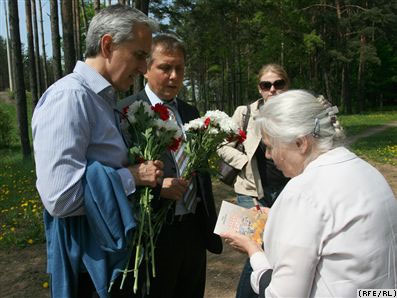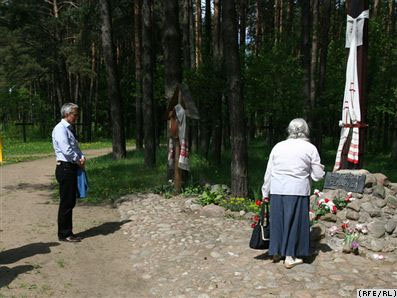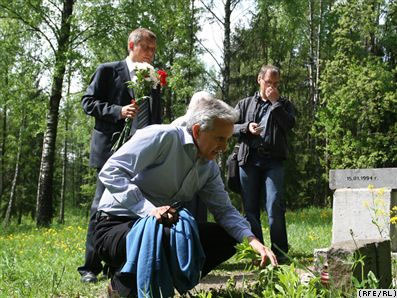RFE/RL President: Regime’s legalization is the worst thing we could do
1- 22.05.2009, 9:24
During his visit to Minsk President of Radio Free Europe/Radio Liberty Jeffrey Gedmin was denied an audience with Alyaksandr Lukashenka.
Authoritarian regimes look stable, but they are not so, as they are founded on fear, work of police and limitations, and not a real support, the president of the US radio station said.
Mr Gedmin evaluated the situation in Belarus and the EU and US roles in its democratization. He is also set to address the Belarusian leader with a request to assign a date for an audience.
- Mr Gedmin, you are in Belarus for the first time, and you are the first Radio Free Europe/Radio Liberty president to visit Minsk. What does your visit indicate?
- It indicates a dialogue and devotion to the people of Belarus. Its meaning for the Belarusian authorities is a different question. Yes, a visa has been issued for me, but I was denied a meeting with Alyaksandr Lukashenka and the head of the Belarusian Foreign Ministry. But we hope these meetings will take place.
- Radio Free Europe/Radio Liberty broadcasts for 30 countries, including Iran and Iraq. Why the Belarusian service remains necessary?
- Our goal is to bring independent, precise and unbiased information and news to the countries which are going through a transition period and do not have an established system of free mass media, or to the authoritarian countries where such mass media are lacking. It’s up to you to judge to which category Belarus should belong. However the European Union, the US and human rights organisations believe that Belarus does not have enough independent press and has no pluralism. That’s why we exist.
- Radio Free Europe/Radio Liberty has a long experience in supporting democracy. Do you think the EU and the US can do more for the freedom of press in Belarus?
- Certainly. Neither the EU nor the US do not dictate or impose anything on Belarus. Belarusians choose for themselves. But it is not indifferent to us what choice it would be, as our societies are based on concrete values. We are for Belarus where pluralism, tolerance and respect to diversity exist. There are no such things in Belarus today. For a start the EU and the US should make it clear to your country’s citizens and the government that stability and security, energy and economy are important for us, but they cannot be divided from issues of human rights observance.
- Do you think Brussels and the US are doing enough?
- No, I don’t think so. You are saying Brussels, but one shouldn’t forget that the EU is a community of countries each of them having its own opinion. Three weeks ago I met with the Lithuanian president in Vilnius, and I was simply amazed how much your neighbouring country thinks about Belarus and situation with human rights. Lithuanians are proud of their young democracy and membership in the EU and the NATO, and they see that Belarus is a European country which wants to be more liberal and progressive and modern, but all this is retarded by the Belarusian government.
The new US administration is finding feet now, and is looking for its way between “realpolitik” and values. It is not choosing between them, but is attempting to mix them in a right proportion, I hope with a due emphasis on human rights and democracy.
- …but it does not show great interest to the countries of the Eastern Europe, and Belarus in particular.
- Yes. The top issue of the agenda is the global financial crisis, then war in Afghanistan and a difficult situation in Pakistan, then Iran, where the present government could get access to nuclear arms. But two decades ago the US called upon creation of Europe, united and free. Now we are at midway: Poland, Hungary, the Czech Republic, the Baltic States have reached remarkable progress and have become a part of the EU. Here in Minsk there is a wonderful sunny day, lots of young people, movement… I do not believe that if Belarusians offered a choice they would say: we want dictatorship, governmental regulation of economy, less possibilities and state monopoly on mass media…
- So it’s in the hands of Belarusians, isn’t it?
- The future of the country, yes. And Belarusians are to decide whether to ask support from the EU and US, and what kind of support.
- And do they ask for it? Is it a government of people?
- Here we could return to the things with which we have started. Not at once, but he authorities have given me a possibility to come to Minsk. It is the first step, very modest, but its’ a step. The US should conduct two dialogues with Belarus. Firstly, the authorities should be made understand that under no conditions we would remove from the agenda issues of respect to human rights and freedom of the mass media. And secondly, in which certain European countries succeed, we should do everything possible to develop relations with Belarusians. Through exchanges, educational programs, contacts in the sphere of art, science, literature, music – everything that would put the American society in touch with wide sections of the Belarusian population.
Choosing between isolation and interaction with Belarus, I am for the latter. But if efforts of the EU and the US would result just in support of business and legalization of the regime, it would be the worst thing we could do. Interaction is opening of the society and pressure on enemies of the freedom of the press, human rights and freedom of NGOs. We can and should work in this way.
- Do the US and Brussels have instruments for that?
- Even several. The US maintains and reconsiders sanctions against certain Belarusian companies. It should be a step-by-step policy. We should demonstrate that steps in response to signs of a real liberalization, political and economic ones, would be done by us. As for the EU… If discussions about future relations with the united Europe are conducted inside Belarus, the window of possibilities for the country should be opened. Maybe it won’t become the EU member over a year. But who knows what would happen in 10 years?
- Under what conditions the Belarusian service of Radio Liberty could stop broadcasting?
- We do not have concrete conditions. As the experience of the last 20 years shows, the most important things are internationally recognized election, freedom of the press and assembly, possibilities for work of non-governmental organisations. A service stops broadcasting when there is no need for us. When there would be pluralism in Belarus, who would listen to a radio with headquarters in Prague?
- You have spent two days in Minsk. Do you think that everything would be the way you say in the 10 next years?
- I am an American, so I am naively and pathologically optimistic. The history teaches us that authoritarian regimes… let us call things by their proper names, the regime in Belarus is not democratic… they look stable, but they are not so, as they are founded on fear, work of police and limitations, and not a real support.
In ten years? In 1989, though it was a different time, a different context and a different country, – despite of the strong power and disunited opposition, Communism collapsed in Eastern Europe, though nobody believed this possibility. I am not saying that changes in Belarus would be radical and rapid, no. But who knows?

Jeffrey Gedmin during the visit to Kurapaty memorial on May 21. Excursion is given by the scientific head of the memorial Maya Klyashtornaya

Jeffrey Gedmin lays flowers to the cross of “Martyrs of Belarus”










